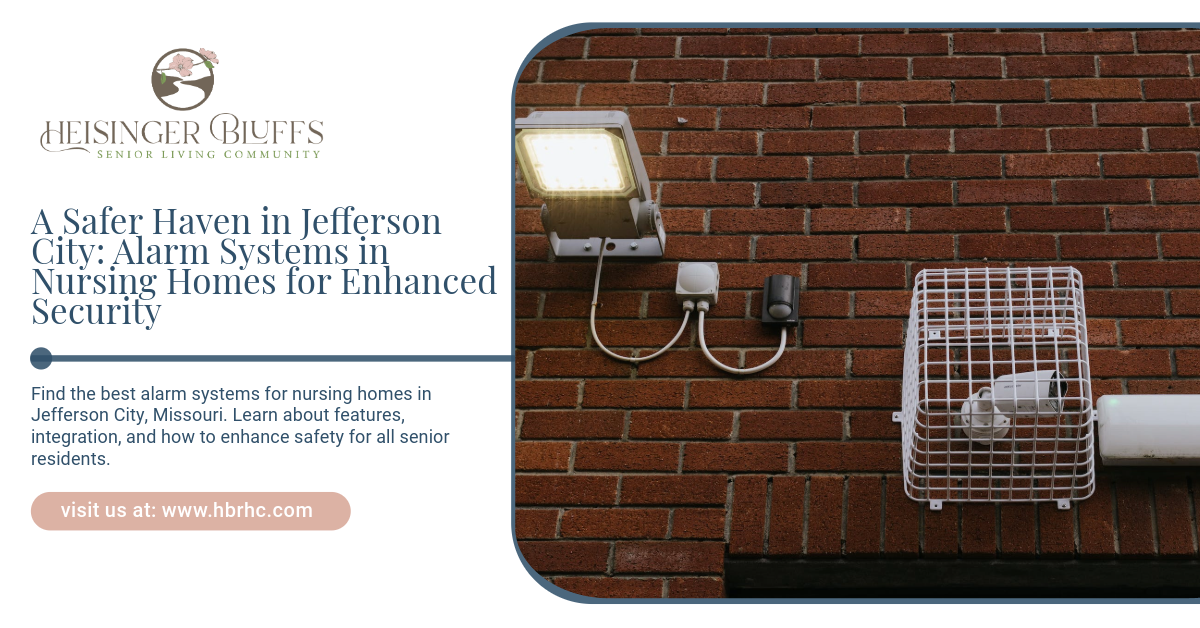A Safer Haven in Jefferson City: Alarm Systems in Nursing Homes for Enhanced Security

Understanding Nursing Homes Safety in Jefferson City, MO
The safety and security of residents in nursing homes are of paramount importance. Effective alarm systems are essential tools that help ensure a safer environment for the elderly, particularly in Jefferson City, Missouri, where caregivers and family members are seeking the best care options for their loved ones.
Importance of Alarm Systems in Nursing Homes
Alarm systems in nursing homes are crucial for enhancing the safety and security of the residents, as well as the staff and visitors. They serve as an immediate notification mechanism during emergencies or potential risks. These systems provide timely alerts that can facilitate quick responses to emergencies, reduce response times, and thereby improve the overall safety outcomes for residents. Moreover, alarm systems are integral to emergency preparedness in nursing homes, ensuring that prompt action can be taken in situations such as fire, medical emergencies, or other critical incidents. The effectiveness of these systems, however, depends on their proper use and management to avoid negative consequences like alarm fatigue and staff desensitization.
Types of Alarms Used
Nursing homes employ various types of alarm systems, each designed to address specific safety concerns and needs:
- Bed Alarms: These alarms are activated when a resident at risk of falling attempts to leave their bed. They are an alternative to physical restraints and are considered a
common method for managing clinical situations in patients prone to wandering. Bed alarms are encouraged as a less costly safety measure and are relatively easy to implement.
- Wander Management Alarms: Designed to alert staff when a resident with cognitive impairments, such as dementia, attempts to leave a designated safe area. These alarms are crucial for preventing residents from putting themselves in harm's way.
- Emergency Call Systems: Often found in resident rooms and bathrooms, these systems allow residents to alert staff in case of an immediate need for assistance.
- Fall Detection Sensors: These sensors can detect a fall, which is particularly useful since falls are a significant concern in long-term care facilities. They can potentially aid in fall reduction when combined with other preventive measures.
- Fire Alarm Systems: Essential for fire safety in nursing homes, these systems provide alerts for immediate evacuation and are subject to strict regulatory requirements.
| Alarm Type | Purpose |
|---|---|
| Bed Alarms | Alert staff when a resident attempts to leave their bed |
| Wander Management Alarms | Notify staff when a resident leaves a safe area |
| Emergency Call Systems | Allow residents to signal staff for help |
| Fall Detection Sensors | Detect falls and alert staff |
| Fire Alarm Systems | Provide evacuation alerts in case of fire |
Researchers emphasize that while these devices can enhance safety, they must be balanced to maintain safety without causing unnecessary disruptions to the quality of care. Additionally, the ethical considerations of alarm systems, such as perceptions of restraint, must be thoughtfully addressed to ensure the dignity and freedom of residents are upheld. As technology advances, surveillance systems in nursing homes and other innovative solutions are continually being developed to further enhance resident safety and care.
Alarm Systems and Senior Resident Care in Jefferson City Nursing Homes
Alarm systems are integral to ensuring the well-being and safety of residents in nursing homes, specifically in Jefferson City, Missouri. Their primary function is to provide timely alerts that can facilitate quick intervention during emergencies, enhancing residents' protection and staff efficiency.
Enhancing Nursing Homes' Emergency Response
The implementation of alarm systems in nursing homes is a critical component in enhancing emergency response capabilities. According to ScienceDirect, these systems significantly reduce response times and improve overall safety outcomes for residents. This is particularly vital in scenarios where every second counts, such as medical emergencies, fires, or when a resident is in immediate need of assistance.
For example, bed alarm systems alert staff when residents who are at risk of falling attempt to leave their beds, allowing for a swift response to prevent potential injuries. Other systems may include call buttons for residents to press when they require help, ensuring that they receive prompt attention.
To further delve into the importance and implementation of various safety measures, readers can explore topics like fire safety in nursing homes and emergency preparedness in nursing homes for comprehensive guidelines.
Challenges and Considerations in Nursing Homes
While alarm systems serve as crucial tools for resident care, they are not without their challenges. One significant issue is alarm fatigue among staff, a phenomenon where the frequent sounding of alarms leads to desensitization, potentially causing delayed reactions to actual emergencies. As highlighted by ScienceDirect, this can have negative consequences on resident care.
Another consideration is the balance between safety and resident autonomy. Alarm systems, while protective, can sometimes be perceived as intrusive or restrictive. It is essential to ensure that these systems are used in a manner that upholds the dignity and independence of residents.
Moreover, there is an ethical discussion surrounding the use of bed alarm systems as reported by NCBI. These systems, intended to prevent falls, can be seen as a form of restraint, albeit not physical. They should be employed thoughtfully, keeping in mind both the physical safety and psychological comfort of the residents.
To address these issues, nursing homes must develop tailored alarm management strategies. This involves creating effective policies, investing in staff training, and performing regular maintenance checks to ensure that alarm systems function optimally without causing undue stress or harm.
As technology advances, new solutions are emerging to overcome past limitations of alarming devices. Innovations are aimed at reducing false alarms and increasing accuracy, thereby enhancing resident safety and staff confidence in the technology.
For caregivers and family members researching the best options for their loved ones, it's important to consider the types of alarm systems available and their implications for resident care. Additional resources such as medication safety in nursing homes and surveillance systems in nursing homes provide further insights into comprehensive safety measures within these facilities.
Ethical Perspectives on Alarms in Jefferson City Nursing Homes
The integration of alarm systems in nursing homes is a critical component of ensuring the safety of senior residents in Jefferson City, MO. However, the use of such systems carries with it ethical considerations that must be addressed to respect the residents' sense of autonomy and maintain their dignity.
Perceptions of Restraint in Nursing Homes
Alarm systems, particularly bed alarms, are often employed in nursing homes to prevent falls or unmonitored wandering. However, a study reflected that 74% of nurses considered the bed alarm system as a form of restraint. Factors influencing this perception included the hospitals they belonged to, their years of experience, and the content of education they received. Interestingly, nurses with less experience were more likely to view the bed alarm system as a restraint compared to their more experienced counterparts.
| Perception | Percentage |
|---|---|
| Bed Alarms as Restraint | 74% |
| Bed Alarms as Not Restraint | 26% |
These statistics underscore an ethical concern: while bed alarms do not physically bind a patient, they can be considered a protective device. The question arises whether their use infringes on the personal freedoms of residents or whether they serve a necessary protective function.
Balancing Safety and Dignity in Nursing Homes
The primary goal of alarm systems in nursing homes is to enhance elderly resident safety by alerting staff to potential dangers. However, alarms are often perceived as intrusive and noisy, which can be distressing to residents and even contribute to a heightened risk of falls. Effective staff education, proper implementation, and oversight are paramount in ensuring that alarm systems serve as beneficial interventions for residents, particularly those prone to falls in long-term care (LTC) facilities.
Alarming devices have been a point of contention within nursing facilities due to mixed beliefs about their effectiveness. Seniors, families, staff, and regulators often hold conflicting views on whether these devices can adequately alert staff to unsafe situations. This leads to contrasting opinions regarding their use.
It is essential to strike a balance between ensuring safety and upholding the dignity and autonomy of residents. Alarm systems should be part of a broader strategy that includes emergency preparedness in nursing homes, medication safety, and adherence to fire and safety standards. When alarms are employed thoughtfully and sensitively, they can be a valuable tool in protecting the well-being of residents without compromising their right to dignity and freedom of movement.
Alarm Management Strategies in Jefferson City Nursing Homes
Effective alarm management is crucial in nursing homes to enhance resident safety and ensure that staff can respond swiftly in emergencies in Jefferson City, Missouri. Developing robust policies and investing in staff education are key to optimizing the functionality of alarm systems.
Developing Effective Nursing Homes Policies
To create a safe environment, nursing homes must establish comprehensive alarm policies. These policies should be tailored to the specific needs of the facility and its residents. Effective policies cover:
- Criteria for alarm use, ensuring alarms are employed appropriately and to the benefit of the residents.
- Protocols for responding to alarms promptly to minimize potential risks or harm.
- Procedures for regular testing and maintenance of alarm systems to guarantee their reliability.
The table below outlines the components of an effective policy framework for alarm systems in nursing homes:
| Policy Component | Description |
|---|---|
| Alarm Utilization Criteria | Guidelines identifying when and how alarms should be used |
| Response Protocols | Step-by-step procedures for staff to follow when an alarm is triggered |
| Maintenance Schedule | Timelines for routine checks and servicing of alarm equipment |
Citing research from ScienceDirect, properly designed alarm systems can significantly reduce response times and improve safety outcomes. Thus, policies must be designed to enhance the benefits of these systems while minimizing any potential disturbances.
Nursing Homes Staff Training and Maintenance
For alarm systems to be effective, it is imperative that nursing home staff are well-trained on their use and the protocols for responding to them. Staff education should encompass:
- Understanding the types of alarms present and their purpose.
- Recognizing alarm signals and knowing the immediate actions to take.
- Being aware of the facility's emergency preparedness plans (emergency preparedness in nursing homes).
Regular maintenance of alarm systems is also essential to prevent malfunctions that could jeopardize resident safety. A maintenance schedule should include:
- Routine inspections and testing of all alarm components.
- Immediate repairs for any identified issues.
- Documentation of all maintenance activities for regulatory compliance and internal review.
The importance of balancing safety with the quality of care is underscored in research from ScienceDirect, emphasizing that alarms should not disrupt the care environment. Staff training programs should reflect this balance to ensure alarms are a beneficial tool rather than an intrusive element.
By implementing these alarm management strategies, nursing homes in Jefferson City, Missouri, can enhance the safety and security of their residents. This, in turn, provides peace of mind for caregivers and family members looking for senior nursing homes in the area. Ensuring the proper use and maintenance of alarm systems in nursing homes is a critical step in providing quality senior care.
Technological Innovations in Nursing Homes Alarms in Jefferson City, MO
In the landscape of senior care, the integration of technology within alarm systems has revolutionized safety measures in Jefferson City nursing homes. Technological advancements have paved the way for sophisticated solutions that enhance security while prioritizing the autonomy and dignity of residents.
Intelligent Video Technology
Intelligent video technology represents a significant leap forward in monitoring systems within nursing homes. This cutting-edge technology is designed to differentiate between regular activities and potential incidents, such as falls, which are a common concern in these settings. According to research published by ScienceDirect, the deployment of intelligent video technology in nursing homes could substantially decrease fall incidents among residents. Its precision in assessing fall risks enables caregivers to respond more effectively to resident needs.
Furthermore, intelligent video technology addresses critical ethical considerations by enhancing resident safety without infringing on privacy or dignity. The technology's capability to provide accurate assessments while being unobtrusive is a crucial aspect of care in nursing homes, ensuring that residents feel secure without feeling constantly watched or restricted.
| Feature | Benefit |
|---|---|
| Differentiation of activities | Reduces false alarms and enhances response to real incidents |
| Privacy-preserving design | Maintains resident dignity while ensuring safety |
| Real-time analysis | Allows for immediate intervention when necessary |
Real-Time Monitoring Benefits in Nursing Homes
The benefits of real-time monitoring with intelligent video technology in nursing homes are manifold. This technology offers continuous surveillance of resident activities, enabling staff to swiftly intervene during emergencies, such as falls or health crises. The prompt response to such incidents is vital in preventing further harm and ensuring the well-being of residents.
Research indicates a notable reduction in the number of falls and related injuries among residents with the implementation of these advanced alarm systems. As a result, the overall quality of care and resident outcomes have seen significant improvements. The proactive approach to fall prevention and resident safety provided by intelligent video technology serves as an invaluable tool for caregivers, enhancing their ability to mitigate risks effectively.
The integration of these innovative alarm systems aligns with the increasing emphasis on emergency preparedness in nursing homes, ensuring that the safety and security features of nursing homes in Jefferson City, Missouri, and beyond are equipped to handle potential challenges.
Real-time monitoring through intelligent video technology not only bolsters the physical safety of residents but also contributes to a more comprehensive approach to medication safety and general welfare, weaving a tighter safety net within the nursing home environment. As the landscape of senior care continues to evolve, these technological innovations in alarm systems stand as a testament to the commitment to safeguarding our seniors with the utmost respect for their independence and quality of life.
Regulatory Requirements in Jefferson City Nursing Homes
Ensuring the safety of elderly residents in nursing homes in Jefferson City, Missouri, is of utmost importance, and regulatory requirements play a crucial role in establishing and maintaining standards for alarm systems. These regulations are designed to protect both the physical and emotional well-being of residents by preventing potential hazards and promoting swift emergency responses.
Fire and Safety Standards in Nursing Homes
Fire and safety standards are critical components of nursing home regulations. As per recent mandates, all care facilities, including nursing homes, are required to have comprehensive fire alarms and sprinkler systems that comply with specific standards. For example, since 2014, there has been a significant push for facilities in Ontario to install sprinkler systems within a set timeframe and to ensure fire alarm monitoring by January 1, 2015.
These systems must adhere to the CAN/ULC-S561 standard, which may necessitate upgrades for certain facilities to meet the requirements. The table below outlines the key fire and safety standards for nursing homes:
| Standard or Requirement | Description |
|---|---|
| Sprinkler System Installation | Mandate for installation within five years (since 2014) |
| Fire Alarm Monitoring | Required by January 1, 2015 |
| CAN/ULC-S561 Compliance | Necessitates upgrades and a ULC Certificate |
For more detailed information on fire safety measures, please refer to our comprehensive guide on fire safety in nursing homes.
Nursing Homes Monitoring and Certification
Monitoring and certification are pivotal to ensuring that the fire safety systems in place are functioning correctly and are maintained to the highest standard. Facilities must obtain a ULC Certificate as evidence of thorough testing and maintenance. This certificate serves as tangible proof to Authorities Having Jurisdiction (AHJ) and insurance companies that the facility's alarm systems are reliable and effective.
Facilities unsure about their fire alarm monitoring requirements can seek guidance by contacting Fire Monitoring at 1 888 789 FIRE (3473), emailing fminfo@fire-monitoring.com, or filling out a contact form on their website. Additionally, those uncertain of their occupancy type should reach out to their local building department or fire department to ascertain the appropriate fire alarm monitoring needs based on the facility's nature.
For a broader understanding of surveillance and monitoring requirements in nursing homes, readers can explore our section on surveillance systems in nursing homes. Moreover, information on medication safety and emergency preparedness, which are also governed by regulatory standards, can be found in our articles on medication safety in nursing homes and emergency preparedness in nursing homes, respectively. These resources provide valuable insights into creating a safer environment for nursing home residents through adherence to regulations and proactive safety measures.
Choosing the Right Alarm System for Jefferson City Nursing Homes
Selecting the appropriate alarm system for a nursing home is a critical decision that can significantly impact the safety and well-being of senior residents. In Jefferson City, Missouri, caregivers, and family members must consider various factors to ensure that the alarm systems in nursing homes meet the specific needs of the elderly and enhance the overall security of the facility.
Assessing Nursing Home Needs
The first step in choosing an alarm system is to assess the unique requirements of the nursing home. This involves considering the layout of the facility, the mobility of residents, and the specific risks associated with the resident population, such as fall tendencies or cognitive impairments like dementia or Alzheimer’s.
Key considerations include:
- Fall prevention measures
- Monitoring of exits to prevent wandering
- Integration with existing nurse call systems
- Customizable alert levels to cater to different care needs
- The ability to respond quickly to emergencies
By understanding the needs of the facility and its residents, caregivers can identify the features that are most important for maintaining a safe environment.
Features of Wireless Alarms
Wireless alarm systems offer a range of features that make them ideal for use in nursing homes. They provide the flexibility to place equipment where it’s needed without the constraints of wired systems and can be integrated with current monitoring systems for a cohesive care approach.
Some key features of wireless alarm systems include:
- Customizable Alerts: Tailor alert levels to the specific needs of residents, ensuring that staff receive appropriate notifications for different types of incidents.
- Battery Life: Many wireless systems have a long battery life, with some models lasting up to 10 years, which helps to reduce maintenance costs and ensures continuous operation.
- Ease of Installation: Being battery-operated, these systems do not require extensive wiring, making them easier to install and modify as needed.
- Integration Capabilities: Wireless systems can often be integrated with existing
nurse call systems, allowing for efficient monitoring and quick response to alerts.
- Variety of Alarm Types: There are various types of alarms including bed alarms for fall prevention, chair alarms, floor alarms, door alarms, and motion sensor alarms, each serving a specific purpose within the nursing home.
| Alarm Type | Purpose |
|---|---|
| Bed Alarm | Fall prevention |
| Chair Alarm | Resident movement monitoring |
| Floor Alarm | Detection of wandering |
| Door Alarm | Exit monitoring |
| Motion Sensor Alarm | General movement detection |
When choosing the right alarm system, it is also essential to consider regulatory requirements, such as fire and safety standards, to ensure compliance with state and federal laws. Furthermore, selecting systems with a proven track record of reliability and effectiveness in healthcare settings can contribute to better medication safety and overall resident care.
In conclusion, wireless alarm systems are a valuable investment for nursing homes in Jefferson City, MO, providing enhanced security and safety features that are crucial for elderly care. By assessing individual needs and evaluating the features of available systems, caregivers can ensure that they select the best solution for their facility, keeping residents safe and giving peace of mind to their families.
SOURCES:
https://www.ncbi.nlm.nih.gov/pmc/articles/PMC7774491/
https://www.ncbi.nlm.nih.gov/pmc/articles/PMC6473316/
https://www.fire-monitoring.com/blog/care-facilities-nursing-home-fire-monitoring/
https://www.sciencedirect.com/science/article/pii/S2352914822001873











